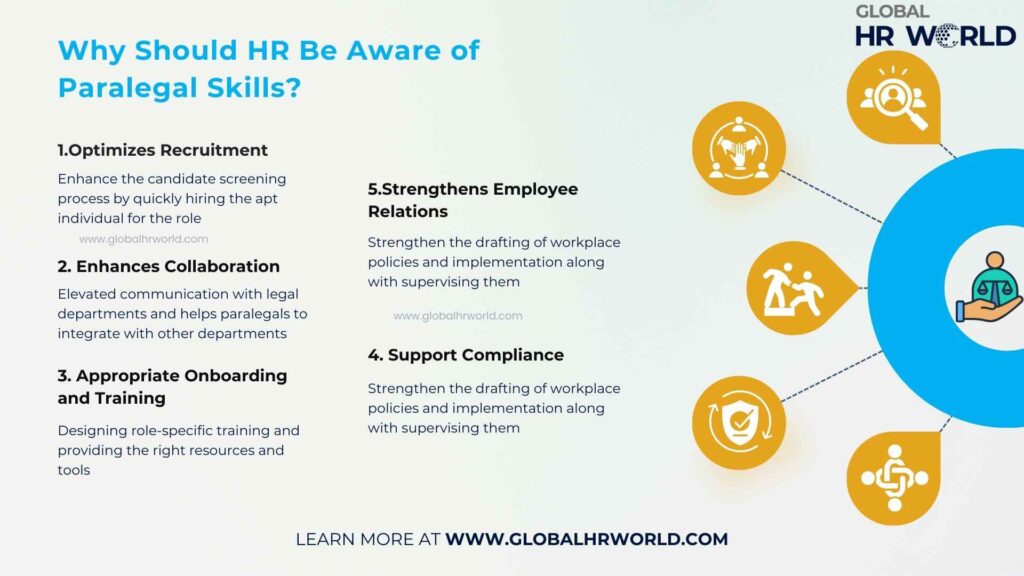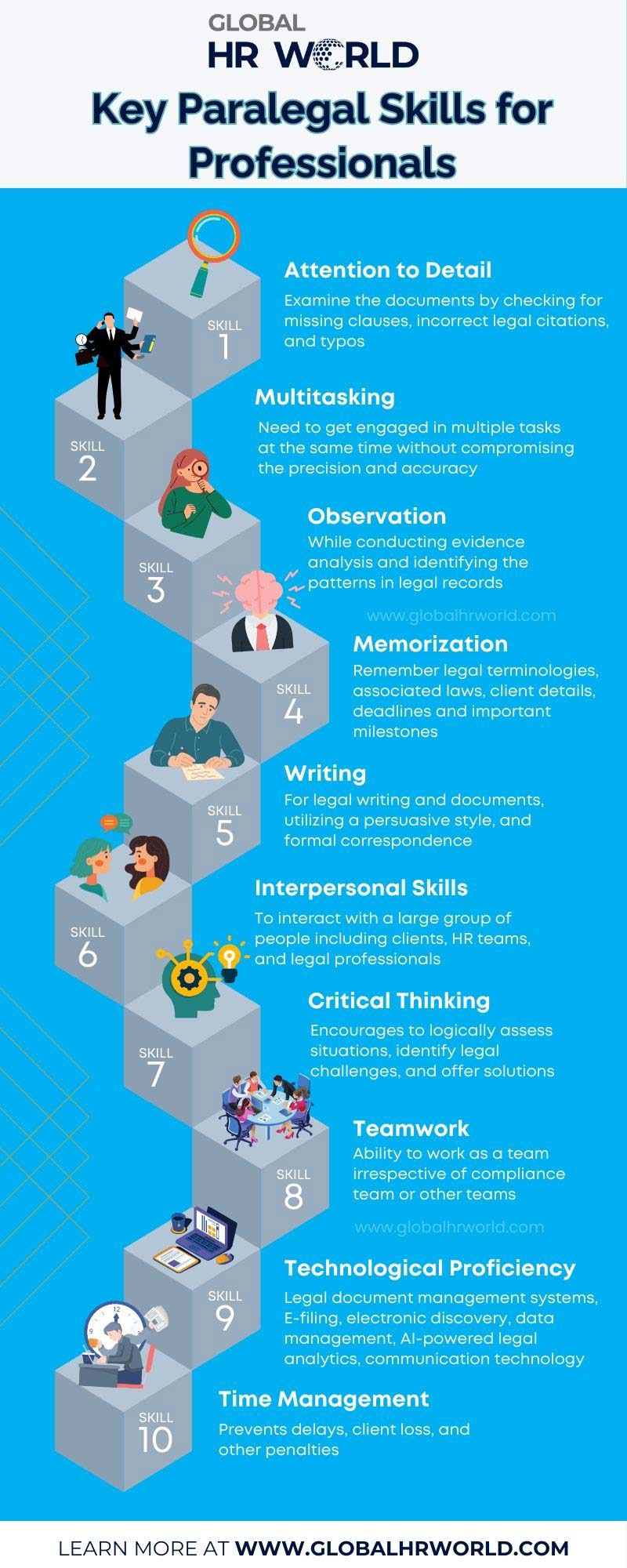Paralegal skills are essential skills that ensure an organization’s legal operations run seamlessly. Having the right paralegal talent is not just confined to law firms, but all organizations to effectively navigate the complexities of law-related issues and elevate legal capabilities. This blog offers insights into paralegal skills, the need for HR professionals to be aware of paralegal skills, and the key paralegal skills to be considered in candidates. Let’s dive in!
What are Paralegal Skills?
A paralegal is a trained legal professional who assists lawyers in performing various tasks related to legal work but is not licensed to practice law independently. Paralegals’ functions include conducting legal research, drafting and maintaining legal documents, and assisting with client communication. According to the U.S. Bureau of Labor Statistics, “the paralegal profession is expected to grow by 1% from 2023 to 2033.” This includes different work settings such as bankruptcy, corporate, family law, immigration, medical malpractice, real estate, etc. In the corporate sector, the key responsibilities of a paralegal include ensuring compliance and regulatory support, drafting, reviewing, and maintaining contracts or legal documents, conducting legal research, intellectual property management, and assisting HR with employment contracts.
To perform these activities, it is required to possess certain competencies. To define, paralegal skills include the abilities that enable individuals to perform the paralegal tasks effectively. These skills encompass a combination of legal expertise and research abilities allowing professionals to ensuring efficiency and compliance in legal procedures.
Why Should HR Be Aware of Paralegal Skills?
As an HR, it is imperative to know the key paralegal skills to ensure hiring candidates who can completely support legal tasks and effectively handle the organization’s legal needs. Here are some of the reasons why an HR professional needs to be aware of different paralegal skills.

Optimizes Recruitment
With a solid understanding of essential paralegal skills, an HR can enhance the candidate screening process by quickly hiring the apt individual for the role and reducing hiring errors. Moreover, the professional can craft clear and targeted job descriptions to attract the right talent along with incorporating appropriate skill assessment strategies while recruiting employees to the organization.
Enhances Collaboration
A better comprehension of paralegal skills by HR enables elevated communication with legal departments and helps paralegals to integrate with other departments, thereby fostering a productive work environment.
Appropriate Onboarding and Training
When HR professionals are aware of paralegal skills, they can enhance onboarding and training by designing role-specific training, providing the right resources and tools that would benefit the new joiner during onboarding, and customizing learning pathways.
Support Compliance
HR can work with paralegals to strengthen the drafting of workplace policies and implementation along with supervising them defining their job responsibilities and monitoring performance. This further reduces errors in contracts and regulatory matters.
Strengthens Employee Relations
With a strong knowledge of paralegal skills, HR can encourage paralegals to craft transparent workplace policies that answer employee rights and their protections. Thus, HR can work with paralegals to ensure smooth hiring and promotion procedures arousing trust in the employees.
Key Paralegal Skills Required for Paralegal Professionals
As paralegals play a crucial role in well-structuring legal matters within an organization, paralegal skills are equally important in safeguarding the organization. The major paralegal skills include legal knowledge, research skills, ability to case management, intellectual property management, and knowledge of legal trends. In addition to these technical skills, paralegal professionals must possess some crucial competencies such as:
Attention to Detail
As legal work involves precise documentation delivered on strict deadlines, attention to detail is a major skill possessed by paralegals. Even a minor error can lead to legal disputes, financial losses, or loss of clients. The employee should have a critical eye in examining the documents by checking for missing clauses, incorrect legal citations, and typos, thereby ensuring accuracy across the tasks.
Multitasking
Paralegal employees need to get engaged in multiple tasks at the same time without compromising the precision and accuracy of any single work. The tasks range from legal researching, preparing legal documents, and communicating with stakeholders to filing and document management requiring paralegal employees to engage in varied tasks at a time.
Observation
The professionals should possess the skill of observation while conducting evidence analysis and identifying the patterns in legal records. Furthermore, observation is essential to spot legal risks or violations before escalating to major issues and ensuring the organizational policies align with industry laws.
Memorization
Memorization is a key paralegal skill essential for employees to work proactively. The professionals should employ memorization to remember legal terminologies, associated laws, client details, deadlines and important milestones, and compliance standards. Possessing the ability to remember and recall proves the effectiveness of task completion.
Writing
Excellent writing skills are crucial for legal writing and documents, utilizing a compelling and persuasive style, incorporating research-based writing, and formal correspondence with clients. Various forms of legal writing and the appropriate language should be mastered by paralegals.
Interpersonal Skills
Paralegals interact with a large group of people including clients, HR teams, and legal professionals, and therefore should possess the interpersonal skills for client service and relationship building. The interpersonal skills is not limited to active narration or communication but include listening, collaboration, and leadership support.
Critical Thinking
Critical thinking is another essential paralegal skill that encourages employees to logically assess situations, identify legal challenges, and offer solutions. While conducting legal research and case analysis, it is crucial to think critically and make sound judgments.
Teamwork
Along with interpersonal skills, paralegals should possess the ability to work as a team irrespective of whether it is a compliance team or other teams to maintain a positive work environment.
Technological Proficiency
With the legal aspects relying more on technology, it is important to possess the skill of elevated technological proficiency enabling the usage of legal document management systems, E-filing, electronic discovery, data management, AI-powered legal analytics, communication technology, and other technological tools.
Time Management
As deadlines and multiple tasks play crucial roles in the paralegal profession, time management is a crucial skill that prevents delays, client loss, and other penalties. Moreover, the professionals should be equipped with the ability to adapt to urgent legal demands.
Conclusion
To sum up, paralegal skills are essential in ensuring that an organization’s legal operations run efficiently, whether within a law firm or a corporate setting. HR professionals must understand these skills to optimize recruitment, enhance collaboration, improve onboarding and training, support compliance, and strengthen employee relations. Key paralegal skills such as legal knowledge, research abilities, case management, and intellectual property expertise are crucial for handling legal complexities.
Additionally, attention to detail, multitasking, observation, memorization, writing, interpersonal skills, critical thinking, teamwork, technological proficiency, and time management are indispensable competencies that ensure efficiency and accuracy in legal functions. By recognizing the significance of paralegal skills, HR can recruit, train, and support the right talent, ultimately strengthening legal capabilities within an organization. A well-equipped paralegal team not only safeguards the company’s legal interests but also fosters a well-structured and compliant work environment, promoting overall organizational success.
Infographic

Knowledge Check!
Frequently Asked Questions (FAQs)
Who is a paralegal?
A paralegal is a trained legal professional who assists lawyers in performing various tasks related to legal work but is not licensed to practice law independently.
What are paralegal skills?
Paralegal skills include the abilities that enable individuals to perform the paralegal tasks effectively.
What are the key paralegal skills?
Key paralegal skills such as legal knowledge, research abilities, case management, and intellectual property expertise are crucial for handling legal complexities. Additionally, attention to detail, multitasking, observation, memorization, writing, interpersonal skills, critical thinking, teamwork, technological proficiency, and time management are indispensable competencies that ensure efficiency and accuracy in legal functions.



